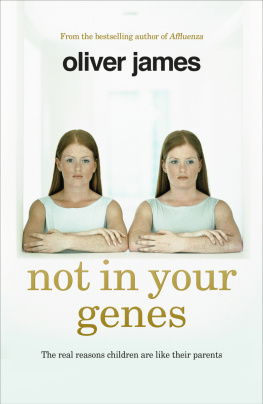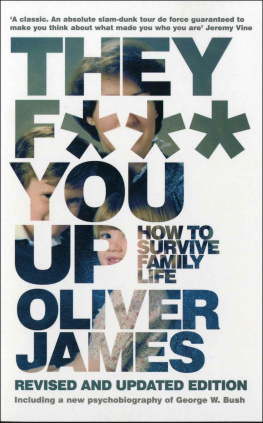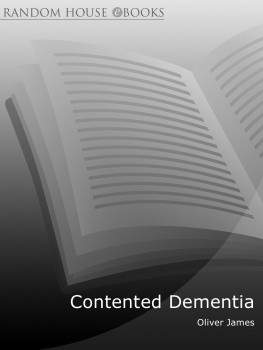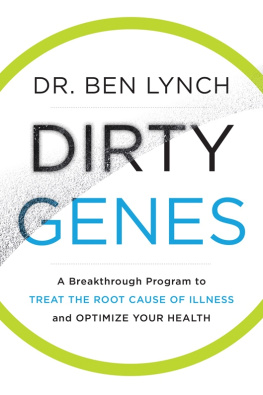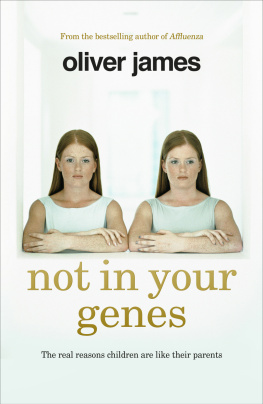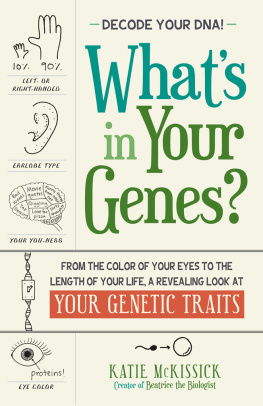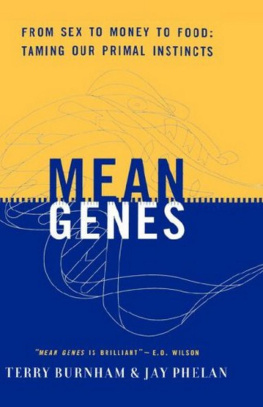Contents
About the Book
Professor Robert Plomin, the worlds leading geneticist, said in 2014 of his search for genes that explain differences in our psychology: I have been looking for these genes for fifteen years. I dont have any.
Using a mixture of famous and ordinary people, Oliver James drills deep down into the childhood causes of our individuality, revealing why our upbringing, not our genes, plays such an important role in our wellbeing and success. The implications are huge: as adults we can change, we can clutch our fates from predetermined destiny, as parents we can radically alter the trajectory of our childrens lives, and as a society we could largely eradicate criminality and poverty
Not in Your Genes will not only change the way you think about yourself and the people around you, but give you the fuel to change your personality and your life for the better.
About the Author
Oliver James trained and practised as a child clinical psychologist and, since 1987, has worked as a writer, journalist and television documentary producer and presenter. His books include Juvenile Violence in a Winner-Loser Culture, the bestselling They F*** You Up and Britain on the Couch, which was also a successful documentary series for Channel 4. He is a trustee of two children's charities: the National Family and Parenting Institute and Homestart.

This ebook is copyright material and must not be copied, reproduced, transferred, distributed, leased, licensed or publicly performed or used in any way except as specifically permitted in writing by the publishers, as allowed under the terms and conditions under which it was purchased or as strictly permitted by applicable copyright law. Any unauthorized distribution or use of this text may be a direct infringement of the authors and publishers rights and those responsible may be liable in law accordingly.
Epub ISBN: 9781448118274
Version 1.0
1 3 5 7 9 10 8 6 4 2
Vermilion, an imprint of Ebury Publishing
20 Vauxhall Bridge Road,
London SW1V 2SA
Vermilion is part of the Penguin Random House group of companies whose addresses can be found at global.penguinrandomhouse.com

Copyright Oliver James 2016
Poem copyright Paul Bamborough
Oliver James has asserted his right to be identified as the author of this Work in accordance with the Copyright, Designs and Patents Act 1988
First published by Vermilion in 2016
www.eburypublishing.co.uk
A CIP catalogue record for this book is available from the British Library
Hardback ISBN 9780091947668
Trade Paperback ISBN 9780091947675
This Be Yet Another Verse
They fuck you up, your little ones
They know just what to say and do
To drain your world of joy and fun
Then blame the misery on you.
But theyll be fucked up in their turn
By children they cant understand,
Wholl teach them what we had to learn
That nothing ever goes as planned.
Child hands back misery to man
It spreads out like a lifeless plain.
Eject them early as you can
And never speak to them again.
Paul Bamborough (2014), pace Philip Larkin
To my sisters, Jessica, Mary and Lucy
Preface
The latest evidence from the Human Genome Project is proving that it is not genes which make psychological traits run in families. There are physical traits that pass down genetically, like height, looks and eye colour, but it now seems very much as if variations in things like mental illness, smartness or shyness, have little or nothing to do with the sequences of DNA which pass from parent to child.
Rather, it is proven that patterns of nurture make us like our parents and grandparents: what travels down the generations is precise kinds of bickering, humour, snide asides, delicious food preparation, beatings, hugging, short-temperedness.
You are like you are because you were related to by both your parents in very particular ways, good and bad. When you have children, you are liable to do exactly the same, or something similar, in many respects, or else react against it.
How you were cared for, especially in early life, was critical. This, in turn, was caused by the way your parents were cared for, all the way back to your grandparents and beyond. The best evidence suggests that nine out of ten maltreated children develop a mental illness as adults. Seventy per cent of maltreated children become maltreating parents themselves.
Much nurture is positive, the love and sensitivity, the teaching of skills, the intimacy. But in almost all families, there are toxic patterns. The implication is that we do not have to go on repeating the past.
Politicians play on our desire to improve our material circumstances in order to provide a more affluent life for our children. If only we could see that, once a basic level of material security has been achieved, it is far more important to pass love down the generations than property, or stocks and shares.
Introduction
I only ever excelled at one skill: dribbling footballs. Alas, I was never an excellent footballer for the simple reason that its a team sport. It is true that I once scored a goal after dribbling around ten players but, when practising with my friends, they used to chant Selfish James never scores.
When my son was aged two he could dribble a football remarkably well and from around aged five, he was doing it in a way that was startlingly similar to how I used to. Aged seven, I sometimes witnessed him dribble past the whole of opposing teams and score.
The interesting thing is that it is impossible that my son could have learnt this from me.
At nine, he was at pains to point this out. Something of a barrack room lawyer, he recorded the following interview with me on my iPhone:
Son: Oliver James, is it true that when you were young you used to dribble exactly like me?
Me: Pretty much true, yup.
Son: Okay. And is it true that you are disabled and I have never seen you play?
Me: It is true.
Son: And is it true I have never seen a photo or a video of you playing football?
Me: That is correct.
Son: So you have to admit that I dribble exactly like you, yet Ive never, ever, ever, ever seen you do it? So is it true that that came from genes?
Me: No.
Son: Why so?
Me: Errrrrrr
Son: Thats all we need.
(The reader can listen to this interview at www.selfishcapitalist.com/ and see a clip of him dribbling. The interview was recorded whilst driving in my car and includes poignant interruptions from the GPS instructing me how to get our destination. My son labelled the file Oliver James Wrong.)
For 27 years I have suffered from multiple sclerosis and for the last 15 that has somewhat impaired my walking. I was not able to dribble from well before my sons birth ten years ago, and there are no recordings or pictures of me performing when young. Neither my wife nor I hothoused his dribbling when small, he was a born dribbler.

